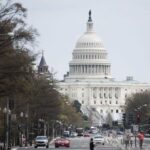Saudi Arabia on Wednesday begins hosting the annual hajj pilgrimage, dramatically downscaled due to the coronavirus pandemic that has barred millions of international pilgrims for the first time in modern history.
Up to 10,000 people residing in the kingdom will participate in the Muslim ritual, a tiny fraction of the 2.5 million that attended in 2019, after what many saw as an opaque selection process that left a wave of applicants rejected.
The foreign press are barred from hajj in 2020, usually a huge global media event, as the government tightens access to the holy city of Mecca and puts in place strict health restrictions to prevent a virus outbreak during the five-day pilgrimage – a key pillar of Islam.
Saudi Arabia has recorded more than 260,000 cases of the novel coronavirus, while the number of declared global infections exceeded 16 million on Sunday.
Mask-clad pilgrims began trickling into Mecca over the weekend and were subject to temperature checks and placed in quarantine, authorities said.
They were given elaborate amenity kits that include sterilized pebbles for a stoning ritual, disinfectants, masks, a prayer rug and the ihram, a seamless white garment worn by pilgrims, according to a hajj ministry program document.
Pilgrims are required to be tested for coronavirus before arriving in Mecca and will also have to quarantine after the pilgrimage. The ministry said it has set up multiple health facilities, mobile clinics and ambulances to cater to the pilgrims, who will be required to observe social distancing.
Saudi authorities initially said only around 1,000 pilgrims residing in the kingdom would be permitted for hajj but local media reports say as many as 10,000 will be allowed.
The hajj ministry has fielded a deluge of anguished queries on Twitter from rejected applicants. But Hajj Minister Mohammad Benten insisted the process was transparent, telling the Saudi-owned Al-Arabiya television that “health determinants” formed the basis of selection.
The ministry said non-Saudi residents of the kingdom from around 160 countries competed in the online selection process. It said foreign residents would make up 70 percent of all selected pilgrims. But it did not explain how many applied, and some disappointed pilgrims have complained that the government-run lottery was not clearly outlined and say no reason was given for their rejection.
Among the chosen few is Nasser, a Riyadh-based Nigerian expatriate, euphoric at winning what he called the “golden ticket” to hajj. “This feeling cannot be described,” he told AFP before his arrival in Mecca.
Even in a regular year, the hajj leaves pilgrims exposed to a host of viral illnesses.
The pilgrims from all over the world wait on the platform to board the light rail trains in Mecca, Saudi Arabia, Aug. 11, 2019. Photo:Xinhua



